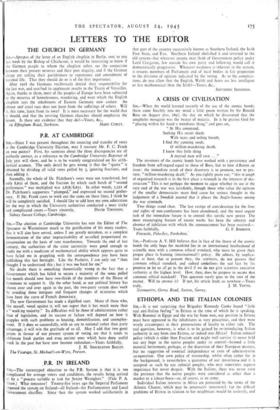SIR,—The election at Cambridge University has sent the Editor of
The Spectator to Westminster much to the gratification of his many readers. But it will also have served, unless I am greatly mistaken, as a complete demonstration of the utter impracticability of so-called proportional re- presentation on the basis of vote transference. Towards the end of last century, the authorities of the sister university were good enough to credit me with a modicum of mathematical ability which appears quite to have failed me in grappling with the correspondence you have been publishing this last fortnight. Like the Psalmist, I can only say " then thought I to understand this ; but it was too hard for me."
No doubt there is something theoretically wrong in the fact that a Government which has failed to secure a majority of the votes polled last month should now have two-thirds of the members of the House of Commons to support it. On the other hand, as our political history has shown over and over again in the past, the two-party system does work by avoiding those intrigues and frequent changes of ministries which have been the curse of French democracy.
The new Government has made a dignified start. Many of those who, like myself, voted against it, will not regret that it has much more than a " working majority." Its difficulties will be those of administraton rather than of legislation, and its success or failure will depend on how it grapples with such problems as housing, demobilisation, and unemploy- ment. If it does so successfully, with an eye to national rather than party advantage, it will win the gratitude of us all. May I add that two great points in favour of our present system of voting are that it tends to obliterate freak parties and even ancient ones which have done useful work in the past but have now become redundant.—Yours faithfully,






















 Previous page
Previous page